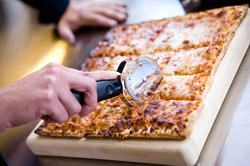Most People With Gluten Intolerance Don’t Know They Have It:
Important Information About This Increasingly Common Condition
by www.SixWise.com
Gluten intolerance, also known as celiac disease, is a genetic digestive disorder that is triggered by the consumption of any foods that contain gluten -- a protein found in several common foods that contain wheat, barley or rye such as bread, pasta, cookies and pizza crust.
|

If you have gluten intolerance foods that contain gluten, including pizza crust, can prevent your body from absorbing important nutrients and eventually lead to serious illness.
|
Gluten intolerance doesn’t discriminate by age as it affects both children and adults. For people diagnosed with celiac disease, ingesting food containing gluten results in havoc on their digestive system.
The gluten protein alerts the body’s immune system and initiates an autoimmune reaction by attacking the lining of the small intestine, resulting in diarrhea, nausea and abdominal pain. Untreated over a period of time this keeps important vitamins and nutrients like iron and calcium from being absorbed. The loss of these nutrients can eventually result in serious health complications, including anemia, osteoporosis and, in some cases, infertility in both men and women.
Gluten-Free Living, the New Health Trend
Gluten intolerance has been earning its reputation in the news and latest headlines as more people begin to turn to a gluten-free lifestyle. A recent study revealed that 15 percent to 20 percent of consumers are seeking out gluten-free foods, though doctors estimate that only 1 percent of these people have been diagnosed with celiac disease.
Even Oprah Winfrey jumped on the gluten-free train when she announced this summer that she was taking a “21-day cleanse” where she eliminated meat, dairy, sugar, caffeine and gluten from her diet.
Researchers believe that most people turning their heads away from gluten don’t have an intolerance to it; they are simply choosing to follow healthier eating habits.
“Many gluten shunners may have no real trouble with gluten,” said Dee Sandquist, a registered dietician in Vancouver, Washington and a spokeswoman for the American Dietetic Association in a USA Today article. “Instead, they feel better because they consume fewer fast and processed foods, which tend to contain gluten. They are eating more fruits and vegetables, which is a good thing.”
According to researchers, people who decide to self-diagnose themselves as gluten intolerant should proceed with caution and be aware of the following:
That said, there has been a sharp increase in the number of people diagnosed with gluten intolerance in the past few years. In 2003, 40,000 Americans were diagnosed with celiac disease. Today that number jumped to 110, 000 people. Another study conducted by the Mayo Clinic showed that celiac disease is not only five times more common than it was 50 years ago, but it is now affecting the lives of 1 out of 100 people.
Based on study findings, scientists attribute the rise in the number of celiac cases to changes in eating habits, eating more processed foods, greater awareness and detection and changes in the way food is processed.
Are You at Risk for Celiac Disease?
Although the exact cause for celiac disease is unknown, it’s known to be passed down by an immediate family member who suffered from it. There are four distinct risk factors:
|

You can still enjoy a wide range of tasty foods if you have celiac disease … meat, fish, poultry, fruit, veggies, rice, potatoes and most dairy products are absolutely fine!
|
Many people continue to suffer from symptoms of celiac disease and live their lives with it without ever being tested for celiac. If left untreated, celiac disease can result in some serious health complications and diseases, including malnutrition, loss of calcium and bone density, lactose intolerance, several forms of cancer and neurological disorders such as epilepsy and peripheral neuropathy.
Living a Full Life After Being Diagnosed with Celiac Disease
Even though there is no cure for celiac disease, by making some dietary changes you can still live a normal and healthy lifestyle. If you have recently been diagnosed with celiac disease the first and foremost step to good health is eliminating gluten from your diet.
Foods with any type of wheat should be avoided. These include farina, graham flour, semolina, durum, barley, rye, bulgur, Kamut, matzo meal, spelt and triticale. Specific foods containing gluten to watch out for are:
|

Looking for some healthy and delicious dessert ideas to make? Gluten-Free French Desserts And Baked Goods has over 100 irresistible recipes for breads, tarts, cakes, puddings, custards, crêpes, cookies, brownies, and bars -- all made with gluten-free ingredients!
|
-
Breads
-
Cereals
-
Crackers
-
Pasta
-
Cookies
-
Cakes and pies
-
Gravies
-
Sauces
Now that you know what is on the “do not eat” list it’s just as important to know all of the foods that you can eat. The following list provides you with basic foods you can eat when adhering to a gluten-free lifestyle:
-
Fresh meats, fish and poultry (not breaded or marinated)
-
Most dairy products
-
Fruits
-
Vegetables
-
Rice
-
Potatoes
-
Gluten-free flours such as rice, soy, corn and potato
-
Gluten-free desserts
For those of you who enjoy your sweets, pasta and breads, rest assured as there are more and more gluten-free items being offered in local grocery stores, restaurants and bakeries. Popular restaurant chains like Outback Steakhouse and Maggiano’s include a gluten-free menu offering to their customers and well-known manufacturers such as General Mills are offering gluten-free options in its Chex cereal and Betty Crocker cake mixes.
Of course, you can also choose to make some of your own sweet treats at home, and you will love Gluten-Free French Desserts And Baked Goods for this! Valérie Cupillard, a prize-winning French author of numerous cookbooks on healthful and organic cooking, has created a cookbook especially for those of you on a gluten-free diet.
"Gluten-Free French Desserts And Baked Goods" provides recipes -- over 100 in all -- for a dazzling array of quick breads, tarts, cakes, puddings, custards, crêpes, cookies, brownies, and bars -- all imaginatively reformulated for gluten-free diets. So if you love homemade desserts and baked goods … this is THE cookbook for you.
Creative Lifestyle Changes and How to Enjoy Eating Out
Rather than staying angry, frustrated and deprived after a celiac disease diagnosis, you’re much better off taking a positive attitude and making the decision to take control of your health by making a few dietary changes. Below are some tips to making healthy food choices and being an aware and health-conscious consumer:
-
When in doubt, contact the manufacturer: If you are unsure even after reading the ingredients whether or not the food product contains gluten, don’t hesitate to pick up the phone and call the manufacturer.
And if you are traveling, the Print Examiner put together a top 10 list of cities that offer the best gluten-free menu options. So if you have a choice, plan your next trip in one of these trend-setting cities!
Top Ten U.S. Cities for the Best Gluten-Free Dining
-
Atlanta
-
Austin
-
Chicago
-
Denver
-
New Orleans
-
New York City
-
Orlando
-
San Antonio
-
San Francisco
-
San Diego
Recommended Reading
The Gluten-Free Label: What it Means, What it Doesn't & What Everyone With Gluten Sensitivity Needs to Know
Get Abdominal Pain, Diarrhea or Other Digestive Issues? It May Be Celiac Disease
Sources
USA Today July 6, 2009
The Spokesman Review July 14, 2009
Print Examiner July 14, 2009
Mayo Clinic, Celiac Disease
ABC News July 6, 2009